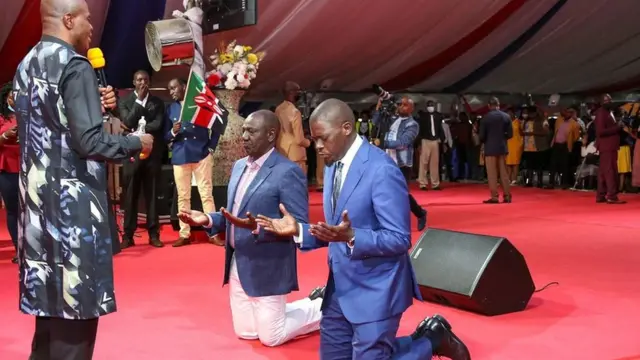By Our Reporter
President William Ruto on Wednesday issued a public and wide-ranging apology to Kenya’s neighbours—Uganda and Tanzania—as well as to the country’s youthful population, in a gesture aimed at easing regional tensions and acknowledging domestic discontent. The remarks were delivered during the Annual National Prayer Breakfast held in Nairobi, a key event on Kenya’s national calendar.
“Our neighbors from Tanzania, if we have wronged you in any way, forgive us. Our friends from Uganda, if there is anything that Kenyans have done that is not right, we apologize,” President Ruto said in his address.
He also turned inward, offering an emotional appeal to Kenya’s younger generation:
“To our children, if there is any misstep, we apologize. We want to build a relationship that will make our country great.”
Context: Rising Regional and Domestic Friction
President Ruto’s apology comes against a backdrop of escalating diplomatic strain in the East African Community (EAC), particularly following a series of controversial incidents involving cross-border arrests and allegations of state-sanctioned repression.
Just days prior, delegations from Kenya and Uganda—including activists, lawyers, and former officials—were detained and deported in Tanzania after attempting to attend a court hearing for Tanzanian opposition leader Tundu Lissu. Notably, Ugandan human rights advocate Agather Atuhaire and Kenyan activist Boniface Mwangi were reportedly held for several days, allegedly tortured, and then forcibly returned across their respective borders.
These detentions sparked outrage across the region, with numerous civil society organizations and human rights defenders decrying the move as a coordinated crackdown on political dissent.
Online backlash in Kenya following the incident prompted Tanzanian lawmakers to accuse Kenyans of cyberbullying and meddling in internal affairs, further straining ties between Nairobi and Dodoma. The vitriol escalated after Kenyan citizens published the personal contact information of Tanzanian MPs online.
Allegations of Repression and Abductions
Domestically, Ruto’s outreach to young Kenyans is seen as an attempt to address growing concerns about state repression and human rights violations, particularly targeting youth critical of his administration.
In recent months, numerous young activists have reportedly been abducted, tortured, or disappeared under suspicious circumstances, with allegations implicating elements of Kenya’s security apparatus.
The situation has earned Kenya troubling labels from watchdog groups, including “the capital of abductions,” and has led to increasing concern over shrinking civic space.
History of Cross-Border Controversies
President Ruto’s apology also recalls earlier incidents that drew criticism. In 2023, Ugandan opposition figure Dr. Kizza Besigye and political ally Hajj Obeid Lutale Kamulegeya were arrested in Nairobi while attending a book launch and swiftly deported to Uganda, where they faced charges including illegal possession of firearms and treachery.
Likewise, Ugandan activists affiliated with the Forum for Democratic Change (FDC) were arrested in Kisumu while attending a leadership workshop. They were handed over to Uganda’s Internal Security Organisation (ISO), later charged with treason, and eventually released after the case was dismissed.
These episodes have raised questions about collusion among East African governments to stifle dissent across borders. Kenyan opposition leader Martha Karua has accused President Ruto of forging an alliance with President Yoweri Museveni of Uganda and President Samia Suluhu Hassan of Tanzania to crack down on political opposition and critical voices in the region.
While President Ruto’s apology was welcomed in some quarters as a step toward regional healing, it also serves as a reflection of the deepening challenges facing democratic governance, freedom of expression, and human rights in East Africa.
Whether his words will translate into meaningful policy changes or improved relations remains to be seen. For now, the apology stands as a symbolic attempt to reframe Kenya’s role in the region and mend strained relations—both at home and abroad.

